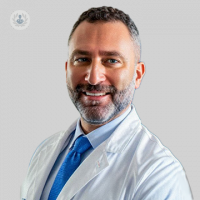Erectile dysfunction: your questions answered
Written in association with:What is considered erectile dysfunction? How is it diagnosed?
Erectile dysfunction (E.D) is the inability to obtain or to sustain an erection that is sufficient for a satisfactory sexual intercourse.
It is normally diagnosed when the doctor looks through the patient’s history. However, sometimes patients don’t feel comfortable in sharing their full story, and so it is often overlooked.
Because the penis is essentially a vascular organ, erectile dysfunction may represent the first warning signal that something in the whole body (and especially the cardiovascular system) does not seem ‘quite right’ and robust evidence shows that it may anticipate a major cardiovascular event.
This is why it is fundamental for patients to discuss any E.D problem with their GP or their andrologist when it arises.

At what age does erectile dysfunction usually start? What are some of the causes of erectile dysfunction?
E.D. can occur at any age. Often young men suffer from difficulties in erections caused by the anxiety (precisely called performance anxiety). This is extremely common and affects almost every man, but the younger population are usually the most affected. This type of E.D. is referred to as ‘primarily psychogenic.’
The build up of cardiovascular risk factors, such as bad nutrition, lack of exercise, smoking cigarettes, obesity and cholesterol with time (ageing process) and the steady decline in testosterone causes a second type of erectile dysfunction that is called ‘vascular’, ‘arteriogenic’ or ‘primarily organic’.
For these patients, the reason for lack of rigidity of the shaft is mainly attributed to the lack of blood supply to the penis, which is caused by the deterioration of the vascular tissue. The penis contains the smallest arteries of the body, therefore E.D is often the very first sign of cardiovascular disease.
Additionally, E.D. may also be caused by hormonal impairment (especially sexual hormones), or be linked to the use of certain medicines. However, there is often a misconception about the causative effect of the medicine themselves and the baseline clinical conditions; doctors know that diabetes, high blood pressure and high cholesterol contribute to E.D. As a result, it is more likely that those who need to take medicines to treat these (or other) conditions will suffer from E.D. due to their pathology, not only as a side effect of the medicine used to treat it.
There is also another type of E.D. that can continue throughout a man’s entire life, where even very young men are able to achieve but never able to sustain an erection. This is caused by a lack of ‘continence’ in the system which traps blood inside the penis during the erection, referred to as ‘venous leak.’
How can erectile dysfunction be treated?
Erectile dysfunction can be treated very successfully. There are several approaches to treat it and the final goal is to obtain patient’s satisfaction in intercourse.
After an accurate and holistic diagnosis, the first need will be to modify reversible risk factors and causes for secondary erectile dysfunction if possible.
Treatment may require the use of a specific class of medication called PhosphoDiesterase type 5 Inhibitors (PDE5-i), which enhance the natural response to excitement (e.g. Viagra). There are also mechanical devices available, such as the vacuum erection device, and the use of transurethral medication, including intracavernosal injections.
One successful treatment which some patients choose to undergo is low intensity external shock wave therapy, which actively rejuvenates the penile tissue.
It is important to complement medical treatment with dedicated support offered by psychosexual counselling. In selected cases, instead, the counselling may be the only therapeutic need.
Finally, end Stage E.D. is the stage when no other treatment has worked. In such cases there is the surgical option of insertion of penile implant (penile prosthesis).
If you are concerned about erectile dysfunction and would like to schedule a consultation with Mr Ollandini, do not hesitate to visit his Top Doctors profile today.


